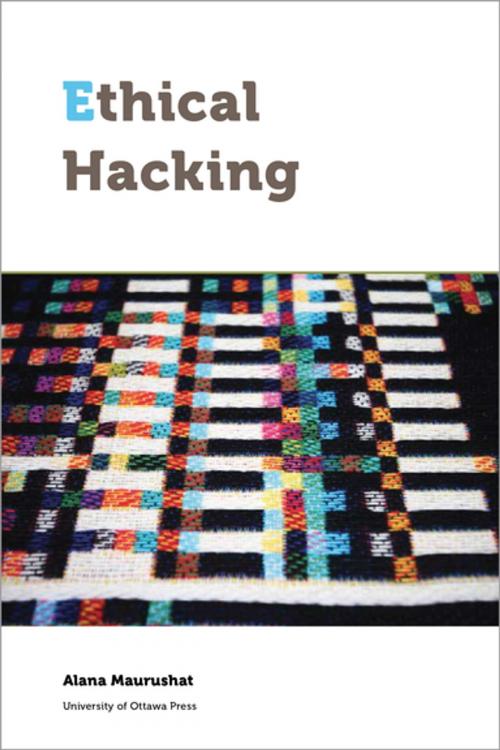Ethical Hacking
Nonfiction, Reference & Language, Law, Science & Technology, Social & Cultural Studies, Political Science, Politics, Civil Rights, Computers, General Computing| Author: | Alana Maurushat | ISBN: | 9780776627939 |
| Publisher: | University of Ottawa Press | Publication: | April 9, 2019 |
| Imprint: | University of Ottawa Press | Language: | English |
| Author: | Alana Maurushat |
| ISBN: | 9780776627939 |
| Publisher: | University of Ottawa Press |
| Publication: | April 9, 2019 |
| Imprint: | University of Ottawa Press |
| Language: | English |
How will governments and courts protect civil liberties in this new era of hacktivism? Ethical Hacking discusses the attendant moral and legal issues. The first part of the 21st century will likely go down in history as the era when ethical hackers opened governments and the line of transparency moved by force. One need only read the motto “we open governments” on the Twitter page for Wikileaks to gain a sense of the sea change that has occurred.
Ethical hacking is the non-violent use of a technology in pursuit of a cause—political or otherwise—which is often legally and morally ambiguous. Hacktivists believe in two general but spirited principles: respect for human rights and fundamental freedoms, including freedom of expression and personal privacy; and the responsibility of government to be open, transparent and fully accountable to the public.
How courts and governments will deal with hacking attempts which operate in a grey zone of the law and where different ethical views collide remains to be seen. What is undisputed is that Ethical Hacking presents a fundamental discussion of key societal questions.
A fundamental discussion of key societal questions.
This book is published in English.
-
La première moitié du XXIe siècle sera sans doute reconnue comme l’époque où le piratage éthique a ouvert de force les gouvernements, déplaçant les limites de la transparence. La page twitter de Wikileaks enchâsse cet ethos à même sa devise, « we open governments », et sa volonté d’être omniprésent. En parallèle, les grandes sociétés de technologie comme Apple se font compétition pour produire des produits de plus en plus sécuritaires et à protéger les données de leurs clients, alors même que les gouvernements tentent de limiter et de décrypter ces nouvelles technologies d’encryption.
Entre-temps, le marché des vulnérabilités en matière de sécurité augmente à mesure que les experts en sécurité informatique vendent des vulnérabilités de logiciels des grandes technologies, dont Apple et Google, contre des sommes allant de 10 000 à 1,5 million de dollars. L’activisme en sécurité est à la hausse.
Le piratage éthique est l’utilisation non-violence d’une technologie quelconque en soutien d’une cause politique ou autre qui est souvent ambigue d’un point de vue juridique et moral. Le hacking éthique peut désigner les actes de vérification de pénétration professionnelle ou d’experts en sécurité informatique, de même que d’autres formes d’actions émergentes, comme l’hacktivisme et la désobéissance civile en ligne.
L’hacktivisme est une forme de piratage éthique, mais également une forme de militantisme des droits civils à l’ère numérique. En principe, les adeptes du hacktivisme croient en deux grands principes : le respect des droits de la personne et les libertés fondamentales, y compris la liberté d’expression et à la vie privée, et la responsabilité des gouvernements d’être ouverts, transparents et pleinement redevables au public.
En pratique, toutefois, les antécédents comme les agendas des hacktivistes sont fort diversifiés. Il n’est pas clair de quelle façon les tribunaux et les gouvernements traiteront des tentatives de piratage eu égard aux zones grises juridiques, aux approches éthiques conflictuelles, et compte tenu du fait qu’il n’existe actuellement, dans le monde, presque aucune exception aux provisions, en matière de cybercrime et de crime informatique, liées à la recherche sur la sécurité ou l’intérêt public. Il sera également difficile de déterminer le lien entre hacktivisme et droits civils.
Ce livre est publié en anglais.
How will governments and courts protect civil liberties in this new era of hacktivism? Ethical Hacking discusses the attendant moral and legal issues. The first part of the 21st century will likely go down in history as the era when ethical hackers opened governments and the line of transparency moved by force. One need only read the motto “we open governments” on the Twitter page for Wikileaks to gain a sense of the sea change that has occurred.
Ethical hacking is the non-violent use of a technology in pursuit of a cause—political or otherwise—which is often legally and morally ambiguous. Hacktivists believe in two general but spirited principles: respect for human rights and fundamental freedoms, including freedom of expression and personal privacy; and the responsibility of government to be open, transparent and fully accountable to the public.
How courts and governments will deal with hacking attempts which operate in a grey zone of the law and where different ethical views collide remains to be seen. What is undisputed is that Ethical Hacking presents a fundamental discussion of key societal questions.
A fundamental discussion of key societal questions.
This book is published in English.
-
La première moitié du XXIe siècle sera sans doute reconnue comme l’époque où le piratage éthique a ouvert de force les gouvernements, déplaçant les limites de la transparence. La page twitter de Wikileaks enchâsse cet ethos à même sa devise, « we open governments », et sa volonté d’être omniprésent. En parallèle, les grandes sociétés de technologie comme Apple se font compétition pour produire des produits de plus en plus sécuritaires et à protéger les données de leurs clients, alors même que les gouvernements tentent de limiter et de décrypter ces nouvelles technologies d’encryption.
Entre-temps, le marché des vulnérabilités en matière de sécurité augmente à mesure que les experts en sécurité informatique vendent des vulnérabilités de logiciels des grandes technologies, dont Apple et Google, contre des sommes allant de 10 000 à 1,5 million de dollars. L’activisme en sécurité est à la hausse.
Le piratage éthique est l’utilisation non-violence d’une technologie quelconque en soutien d’une cause politique ou autre qui est souvent ambigue d’un point de vue juridique et moral. Le hacking éthique peut désigner les actes de vérification de pénétration professionnelle ou d’experts en sécurité informatique, de même que d’autres formes d’actions émergentes, comme l’hacktivisme et la désobéissance civile en ligne.
L’hacktivisme est une forme de piratage éthique, mais également une forme de militantisme des droits civils à l’ère numérique. En principe, les adeptes du hacktivisme croient en deux grands principes : le respect des droits de la personne et les libertés fondamentales, y compris la liberté d’expression et à la vie privée, et la responsabilité des gouvernements d’être ouverts, transparents et pleinement redevables au public.
En pratique, toutefois, les antécédents comme les agendas des hacktivistes sont fort diversifiés. Il n’est pas clair de quelle façon les tribunaux et les gouvernements traiteront des tentatives de piratage eu égard aux zones grises juridiques, aux approches éthiques conflictuelles, et compte tenu du fait qu’il n’existe actuellement, dans le monde, presque aucune exception aux provisions, en matière de cybercrime et de crime informatique, liées à la recherche sur la sécurité ou l’intérêt public. Il sera également difficile de déterminer le lien entre hacktivisme et droits civils.
Ce livre est publié en anglais.















